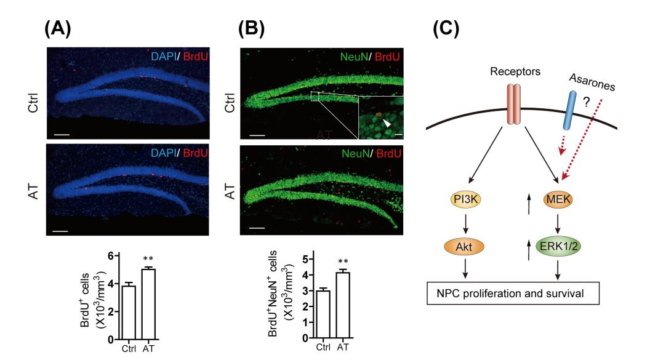Chinese herb “Rhizoma Acori tatarinowii” promotes neurogenesis (birth of neurons) in mice http://bit.ly/1TtRkxH and has long been a principal medicine in traditional Chinese formulas for treatment of brain disorders, such as senile dementia, dysmnesia and stroke.

AsianScientist (Jun. 17, 2015) – Researchers from the Shanghai Institutes for Biological Sciences have found that a herb used in traditional Chinese medicine promotes neural progenitor cell proliferation and neurogenesis. Their results, published in Aging Cell, suggest that the herb Rhizoma Acori tatarinowii could be used to fight against age-related neurodegeneration. Neurogenesis is critical for cognition functions of the brain. However, under the conditions such as aging, chronic stress and central neuron diseases, NPC proliferation decreases dramatically, which leads to the declined neurogenesis and thereby cognition impairment. Therefore, promoting neurogenesis has been considered as a potential therapeutic strategy for anti-aging and aging-related neurodegenerative disorders such as Alzheimer’s disease (AD). Since there are still open questions regarding NPC transplantation such as donor cell source and functional integration, mobilizing endogenous NPCs by pharmacological agents is considered to be an easy and feasible way to provide an alternative cell therapy for neurodegeneration. In traditional Chinese medicine, many herbs are considered beneficial for cognition improvement. Recently, some natural products derived from herbal medicines have been reported to promote NPC proliferation, elucidating the underlying mechanism for the cognition-enhancing effects of these herbal medicines. Rhizoma Acori tatarinowii (AT) has long been a principal medicine in traditional Chinese formulas for treatment of brain disorders, such as senile dementia, dysmnesia and stroke. Under the guidance of Professors Pei Gang and Zhao Jian, graduate student Mao Jianxin and Dr. Huang Shichao found that AT-treatment enhanced hippocampal neurogenesis in wild-type and transgenic AD model mice as well as aged mice.

A: Rhizoma Acori tatarinowii (AT) promoted neural progenitor cell (NPC) proliferation in adult mouse hippocampus. B: AT enhanced neurogenesis in adult mouse hippocampus. C: Schematic diagram shows that asarones promote NPC proliferation through activation of ERK cascades. Credit: Pei Gang/CAS. A: Rhizoma Acori tatarinowii (AT) promoted neural progenitor cell (NPC) proliferation in adult mouse hippocampus. B: AT enhanced neurogenesis in adult mouse hippocampus. C: Schematic diagram shows that asarones promote NPC proliferation through activation of ERK cascades. Credit: Pei Gang/CAS. By fractionation of the AT extract, they identified the active constituents, asarones, which was shown to promote NPC proliferation both in vivo and in vitro. Further, their mechanistic study revealed that treatment with AT or asarones leads to the activation of ERK cascade but not Akt cascade. These findings indicate that AT and asarones, which could be orally administrated, may serve as therapeutic agents to promote neurogenesis, providing a novel way to fight against cognitive decline associated with aging and neurodegenerative disorders. Read more from Asian Scientist Magazine at: http://www.asianscientist.com/2015/06/in-the-lab/chinese-herb-promotes-brain-cell-proliferation/